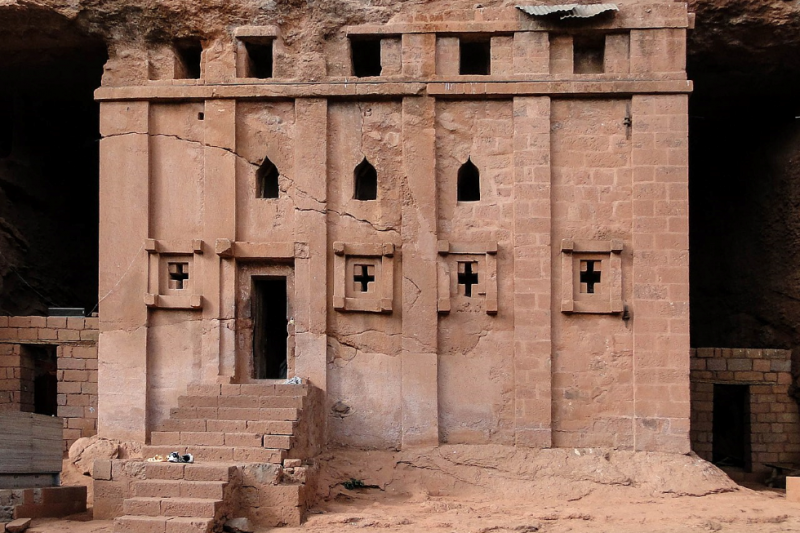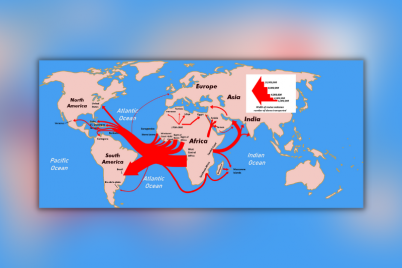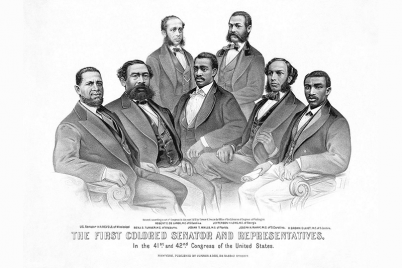Located in Lalibela are the first Christian churches that were chiseled and cut into the mountain stone during the 12th century A.D.
BY JENNIFER GAMBLE-THEARD, M.ED., ASALH Historian
Greetings from Ethiopia, a land of magnificent history that has evolved into a country of unyielding strength in today’s progressing world.
Ethiopia is the oldest independent country in Africa and one of the oldest in the world. What is believed to be the first remains of a human ancestor were discovered there.
During my current travels in Africa, I have finally put my feet down on the land I had only read about but profoundly desired the experience of visiting. I am impressed far beyond what I had imagined.
The capital, Addis Ababa, immediately captivated my attention the minute I stepped off of the airplane and into the new, expansive airport. Most important to me, the hotel where I am staying is elegant, refined, safe and is locally owned, not a chain.
Addis Ababa is a sprawling city of about 5 million people, and in comparison, it seems on the same level as many western cities. It is the country’s commercial and cultural hub that is lifting up the whole nation. Well engineered city streets, intersections and metro rails keep people and vehicles moving, as well as commerce and trade flowing.
Modern tall buildings are everywhere, and there seems to be no end to construction of even more beautiful architectural developments occurring in all parts of the city. Yet, in the mix of development, the older distinct structures such as churches, schools, museums, squares, universities–some dating back as far as the 1800s–still remain.
Uniquely, the Addis Ababa buildings represent a blending of traditional prototypes, indigenous identity and modern design that reflect different eras of architectural development in the country. There is a local sense of pride in how the old and new scenes are woven together to display an esthetic urban feeling.
The history of Ethiopia is timeless and dynamic. The Ethiopian Empire (Abyssinia) made its mark of power in the northeast region of the African continent around 980 B.C. in the time before Christ.
Ancient African kingdoms such as Axum, Nubia, Kush (which had language similarities) were at some point in history considered as a part of the Abyssinian Empire. According to Abyssinian/Ethiopian history, it had a powerful and strong influence on the Red Sea trading system, as well as the rise and development of Egypt.
Although Christianity existed in Ethiopia very early after the death of Christ (Acts 8:26-28), it was not until 330 A.D. that leaders and rulers declared it as a state religion. Ethiopia was the first Christian region of Africa and perhaps the world.
The Orthodox Christians of Ethiopia have maintained the same Christian ceremonies and prayers they began more than 1,800 years ago. Ethiopia has been a protector of other Christians in a region that boarders along Islamic countries.
For 1,600 years, they have celebrated the arrival of the True Cross (a relic of the cross on which Christ died), given by a leader of a besieged border country to an Ethiopian King, the same king that helped to protect Coptic Christians from belligerent Islamic advances. Aksum, in Ethiopia, is famous for claiming the final resting place of the Ark of the Covenant, which contains the 10 Commandments that God gave Moses.
Last week, I returned from the high mountainous city of Lalibela. It’s an early Christian World Heritage Site, known as the Eighth Wonder of the World. Located there are the first Christian churches that were chiseled and cut into the mountain stone during the 12th century A.D., long before Columbus made his trip to the Americas.
There were Christian Orthodox monks and priests, people draped in white who were on a holy pilgrimage and tourist like myself all praying, chanting, singing or quietly meditating. The energy within those sacred mountain walls was spiritually exhilarating.
In biblical history, Ethiopia is mentioned 45 times in which it referenced the land south of Egypt (Gen. 2). Cush (meaning black in Hebrew) is named as the father of Nimrod, the first one called a “king” in scripture (Gen.10:8-10). Other mentions of Ethiopia include Numbers 12, 2 Chronicles 16, 2 King 19, Esther 1, Job 28, Psalms 68, Isaiah 18, Jeremiah 38, Ezekiel 38; Nahum 3 and Acts 8.
Also very important to Ethiopian biblical history, the Old Testament has records of the Queen of Sheba’s visit to Jerusalem where she met with Solomon (1 Kings 10 and 2 Chronicles 9).
Legend asserts that King Menelik, founder of the Ethiopian Empire, was the son of Queen Sheba and King Solomon. Noted also, the Ethiopian Jews were a part of the same ancestry. Ethiopian kings were seen as direct descendants of the House of David, rulers by divine right.
Also, the 20th-century Ethiopian leader Haile Selassie was a member of the Solomonic Dynasty who traced his lineage to Emperor Menelik.
We used to see repeated televised pictures of impoverish children in parts of drought-stricken Ethiopia, but not anymore. Just as the nation has risen, so have its people. The pace of poverty reduction has been impressive, especially compared to other African countries. Health, education and living standards have also improved.
The most definitive pride and glory of Ethiopian spirit is the fact they are the only country in Africa that was never formally colonized. (The sovereign nation of Liberia is often described as never-colonized because it was created in 1847 by the United States).
All of the other African nations or ethnic groups lost too much or everything from European invasion. They were enslaved, raped, looted and controlled, but not Ethiopia!
Ethiopia fought back against Italy and won. They maintained who they had been for centuries and now have been able to step forward into the 21st century with pride.
Jennifer Gamble-Theard, M.Ed. is a retired Pinellas County educator in the study of history and language. She is also the historian for the St. Petersburg Branch of ASALH.








